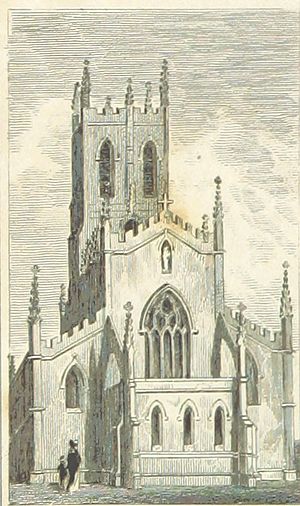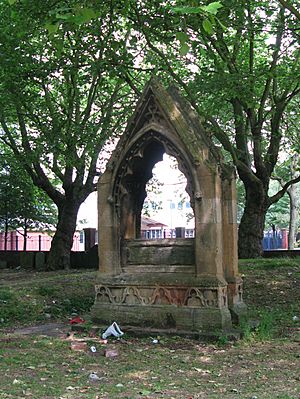St George in the Fields, Hockley facts for kids
Quick facts for kids St George in the Fields, Hockley |
|
|---|---|

St George in the Fields, depicted in an 1830 book
|
|
| 52°29′27.24″N 1°54′17.28″W / 52.4909000°N 1.9048000°W | |
| Location | Birmingham |
| Country | England |
| Denomination | Church of England |
| History | |
| Dedication | St George |
| Consecrated | 6 August 1822 |
| Architecture | |
| Architect(s) | Thomas Rickman |
| Style | Decorated Gothic |
| Completed | 1819 |
| Construction cost | £12,735 |
| Demolished | 1961 |
| Specifications | |
| Capacity | 1,959 people |
St George in the Fields, Hockley, was once a Church of England church in Birmingham, England. It was built a long time ago, in 1822. The church was made bigger later in the 1800s. Sadly, it was taken down in 1961. Today, only the tomb of its architect, Thomas Rickman, remains on the site. This tomb is a special protected structure.
Contents
The Church's Story
Building a New Church
St George in the Fields was a very important church. It was the first "Commissioner's church" built in Birmingham. These churches were part of a plan to build many new churches across England. This happened after the Napoleonic Wars.
The church was designed by a famous architect named Thomas Rickman. He used a style called Decorated Gothic. This style looks like old medieval churches. The building work was done by Benjamin Nowell and Sons. The church was officially opened on August 6, 1822. The Bishop of Chester led the special ceremony.
Changes Over Time
In 1830, St George's got its own parish. A parish is like a local area that a church serves. This new parish was created from a part of the St Martin in the Bull Ring parish.
The church was made larger in 1883. This cost about £2,300, which was a lot of money back then. They added a chancel and a special room for the organ. Bateman and Corser were the architects for this expansion.
Later, in 1856, a part of St George's parish was used to create a new parish. This new area was for St Matthias' Church, Farm Street, Birmingham.
The End of the Church
After many years, the church was taken down. This happened in 1961. Even though the church building is gone, its history lives on.
Thomas Rickman's Tomb
The person who designed the church, Thomas Rickman, was buried in the churchyard. He passed away in 1841. His tomb is still there today. It is considered a "listed structure." This means it's a historic building or monument that is protected. It's a reminder of the church and its architect.
The Church Organ
The church had a large pipe organ. It was first made by a company called Elliott. Later, it was changed by Bishop & Banfield. In 1883, when the church was made bigger, the organ was rebuilt. Nicholson and Ward of Walsall did this work. You can find details about this organ in a special record called the National Pipe Organ Register.
 | Jessica Watkins |
 | Robert Henry Lawrence Jr. |
 | Mae Jemison |
 | Sian Proctor |
 | Guion Bluford |


